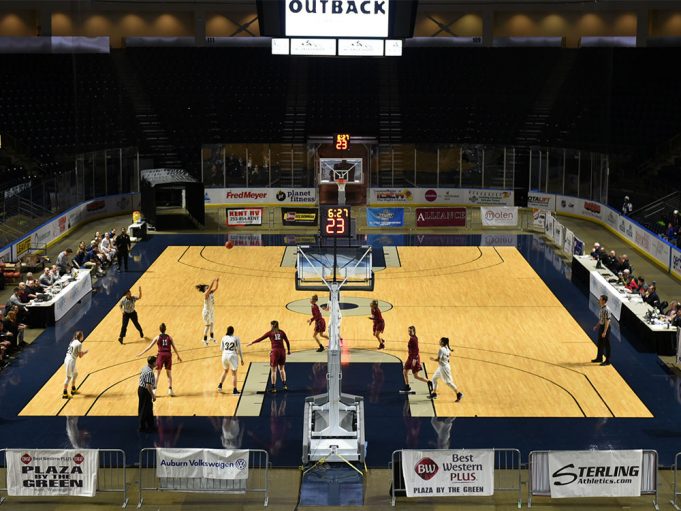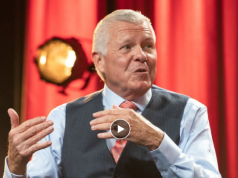Officials strive to do the right thing, enforce the rules correctly and administer the game properly. But inevitably, mistakes will happen. Sometimes it’s an error in judgment; on other, hopefully rare occasions, officials will misapply a rule or handle an administrative issue incorrectly. In the best case, any mistakes will be inconsequential. Unfortunately, that’s not always the case. Gaffes in judgment, rules enforcement or game administration can profoundly impact a game. On occasion, they can cost an athlete or team a victory. But what consequences should officials face for their mistakes? Should they be suspended?
Recently, administrators in two states found themselves confronting that question.
During a Kentucky high school football playoff game between DeSales and Murray, a flag was thrown when an official collided with a coach in the two-yard belt adjacent to the Murray sideline, an area that is supposed to be kept clear while the ball is in play. The play ended in a Murray touchdown. By rule, the touchdown should have counted, and the penalty enforced on the subsequent conversion attempt or the ensuing kickoff, per the option of the defensive team. Instead, the touchdown was nullified, and the 15-yard penalty was enforced from the spot of the foul. The lost touchdown proved critical as Murray lost the game, 14-7.
In the aftermath of the incident, the five-member officiating crew was dropped from the playoffs for the remainder of that season, suspended for the first three weeks of the 2015 season and was declared ineligible for postseason assignments after the opening round this year. In addition, the officials’ association to which the crew belonged had its allocation of playoff assignments reduced for the next season.
The very same evening, a similar play occurred in a playoff game in Oklahoma; the officials erred by taking the score off the board instead of enforcing the penalty on the conversion attempt or ensuing kickoff. In that instance, the crew was barred from working additional playoff games that season but was cleared to work the next season.
During the 2015 NCAA Football season, onfield and replay officials were suspended for two weeks for misapplying an obscure rule that allowed Central Michigan to score the winning touchdown on a play that should not have been run. From then to now, there are numerous suspension examples in multiple sports at multiple levels.
The question of whether officials should be suspended for onfield errors has become a hot-button topic in the industry. Some contend that officials should be sanctioned, that there should be consequences for mistakes. Others maintain that practice is unfair to officials and requires them to meet standards that in practice are unattainable.
Pound of Flesh” or Path to Motivation and Improved Performance? You Decide.
No official is immune to making a mistake, even those working at the highest level of their sport. But in an era when officials are scrutinized more than ever, any mistake — real or perceived — brings about calls for consequences against the officials involved. Some in the industry are concerned that suspensions may be handed out arbitrarily, rather than in accordance with definitive standards.
In the fall of 2015, the NFL sent side judge Rob Vernatchi to the sidelines for a week for not picking up a clock problem in a game between Pittsburgh and San Diego.
Scott Green spent 23 years in the NFL and worked three Super Bowls. He also served as president of the NFL Referees Association and was a key member of the negotiating team during the lockout of officials in 2012. Green believes that if a suspension is handed out, it’s important that all parties involved know the reason why.
“If you’re going to do suspensions, then make sure we know the criteria from which you’re going to make those decisions,” he says. “When they seem to be arbitrary and they don’t seem to be very consistent, then suspensions really don’t serve that much of a purpose.
“It seems like a lot of times,” Green continued, “it’s more of a public-relations activity that’s occurred because the supervisor’s boss has come down and says, ‘You’ve got to do something.’ And that’s fine. You can do something. But make sure we all understand what is going on that’s going to force what we would consider to be pretty extreme and that’s a suspension from officiating.”
Green believes a suspension should be more than punitive. “What is the purpose of the suspension?” he asks. “I mean, it’s definitely punishment, but how does that make somebody a better official?”
J.D. Collins, NCAA’s national coordinator for men’s basketball officiating, believes suspensions may be necessary in some circumstances, particularly if the official in question has been asked to change his way of doing things and is unable or unwilling to do so.
“We as officials are creatures of habit,” says Collins, who spent 20 years on the court at the Division I level. “And we’re stubborn. And we won’t change until we’re forced to change in one way or another.
“I’m not advocating (suspensions) but sometimes that rattling of the cage (tells an official), ‘Wow, he’s been talking to me about this for five years and I did it again and now I’m suspended.’ Is that fair? That’s a question.”
Collins is quick to point out that while there may be occasions when suspending an official is merited, there is no one-size-fits-all protocol that suits every situation.
“I think there are three factors we should all consider when we talk about suspensions,” he says. “The first is price and pressure. As the price you’re getting paid and the pressure along with it goes up, there’s a higher likelihood of the involvement of suspension.
“The second is your contract. It’s possible … you don’t even have a contract. Someone calls you and says go to XYZ school and you go there and referee and get paid and move on. (But) if we sign contracts that say we’re allowed to be suspended and then we do get suspended, we as officials have no right to complain because we signed the contract.
“And then the third factor is the egregiousness of the error. Is it in the last five seconds of a conference championship and you completely really miss a call because of positioning or whatever? The pressure and everything that goes into that is heightened at that point.”
The idea of suspending officials for judgment errors is, to say the least, a touchy subject. NASO issued a statement on suspensions last fall which read in part:
“It needs to be said that those of us in officiating welcome being held accountable for the decisions we make. That comes with the territory. We are tasked with knowing the rules and enforcing them — not setting them aside through being lax or deciding to ‘make it up as we go along.’ In those two situations, we deserve punishment and if what we have done has been egregious, the public should be told that we have violated a trust.
“We can handle that accountability. But what disturbs us is that errors of judgment made during a contest, whether in fact or fiction, result in the suspending of officials. That trend deserves special attention.”
David Coleman, vice president of officiating for the Pac-12, points out that conference policy allows coordinators to take officials off assignments, whether it be for mistakes on the field or their conduct off it.
“I am the coordinator for football,” he says, “but I also work closely with the coordinators of the other major sports. In our agreement with our officials it states that assignments will be made or taken away in the best interest of the conference. So, with that, what do we talk about in terms of … the do’s and the don’ts and the expectations of the conference?”
Coleman lists consistency, accountability, communication and transparency as key elements in his officiating program.
“When we talk about an issue, when we train, when we review video, it all has to do with those four things,” he says. “So, if there’s a situation … where we’re not doing those things, is it in the best interest of the conference for that official to be removed from a game? Or what we’re talking about right here — be suspended?”
Some would argue that being taken off an assignment equates to a suspension. And in fact, apart from the professional level, officials have historically been regarded as independent contractors and not employees. Officials serve at the whim of conference coordinators, assigners or sometimes individual schools that contract officials for their services but are not employers.
But in the end, if an official wants to work and an assigner desires not to use him or her because of a mistake that might have been made previously or removes an official from an assignment for the same reason, that, in practical terms, constitutes a suspension.
At the high school level, some state associations require officials to undergo background checks. Officials can be suspended for such things as not paying dues on time, not attending the required association meetings, missing assignments or perhaps violating the association’s rules on the use of social media. There are occasions when officials have faced sanctions for improper conduct on the field, such as using inappropriate language.
But it is rare for officials below the collegiate level to be suspended for a judgment error or misapplying a rule. In many cases it’s impractical to do so if for no other reason that in some areas there aren’t enough officials to go around.
Michael Fitch, executive director of the Texas Association of Sports Officials (TASO), worked football for some four decades. In addition to his duties with TASO he’s an observer for the American Southwest and Great American conferences.
“We don’t have an inexhaustible supply of officials,” Fitch points out. “At the high school level, we have policies for the association and then each chapter can have their own policies. … But a single misjudgment is certainly not something that we would want to (punish with a suspension). If there was a succession, if that became a pattern, maybe. But it’s kind of hard to chronicle all of the things that might happen.”
Fitch notes that in Texas, suspension issues are generally handled at the local as opposed to the state level. “If there were a misapplication of rules, most likely that would be dealt with at the local chapter level,” he says. “We don’t micromanage the chapters. We let them define what is something that might lead to suspension.
“At the state level we get more involved in the ethical — the failure to follow policies. The other problem that we have that the NCAA and the professional sports don’t have,” Fitch continued, “is that if we suspended a crew in the third week of the season, that chapter may all of a sudden not have enough officials to cover their games. So we have to be a little bit more careful about suspending from regular season games at our level than in the collegiate and the professional level. Playoffs is where we suspend. That hurts the official’s pride probably more than anything else.”
There may be legal issues involved as well. At the professional level, officials belong to associations or unions that bargain collectively on their behalf. The circumstances under which an official can be suspended or terminated in extreme cases are specifically spelled out. At the collegiate level, particularly in Division I, officials sign contracts which stipulate their working conditions. And while they may be told they will receive a certain number of assignments, the conference, officiating consortium or the coordinator retains the right to revoke an assignment for essentially any reason. Officials working Division I serve at the pleasure of those who do the assigning.
Ironically, it is at the high school level where officials have some protections. Depending on the jurisdiction, a member of an officials’ association facing disciplinary action has certain legal rights, particularly if that association is classified as a non-profit organization.
Attorney Alan Goldberger frequently addresses legal issues for Referee. “When you suspend a member of an association, that is a disciplinary sanction,” he says. “That will generate some enforceability problems if somebody challenges (the suspension) in certain states under certain circumstances.
“Suspending an official is tough enough. Addressing or even acknowledging that suspension in the public eye is even tougher.”
A suspension for whatever reason can have longlasting and far-reaching ramifications. When an official’s credibility has been called into question and depending on the circumstances, he or she is likely to find him or herself under additional scrutiny going forward. Which raises the question: Should an official’s suspension be public knowledge?
The NFL publicly disclosed Vernatchi’s suspension almost immediately. When MLB umpire Bob Davidson drew a one-game suspension in 2012 after a profane exchange with then-Philadelphia manager Charlie Manuel, his suspension was immediately disclosed. In the fall of 2009, the Southeastern Conference suspended referee Mark Curles and his entire crew after mistakes in a pair of conference games. According to published reports, it marked the first time the conference ever publicly announced a suspension.
Some would argue that suspensions should be kept quiet, that only the officials involved and the league, conference or assigning agency should be aware of them.
“I learned that we should praise in public and reprimand in private,” Collins says. “And that has a lot to do with my personal philosophy. In my position, I’m asked to go on CBS and talk about plays in the NCAA tournament. (In 2016) I was only on one time that I agreed to on a rule situation where the ball was being dunked and the clock went off and we had to clarify that play. Other than that, I didn’t want to go on because I’m throwing my officials under the bus. As a leader I don’t want to throw my officials under the bus.” Unfortunately, the privacy that Collins and others in the industry crave when an official errs is hard to come by in today’s 24/7 news cycle world. The fact that the suspensions described above became a matter of public record almost immediately is hardly surprising. It can be argued that the leagues had little choice but to take action because the incidents were so widely disseminated. By announcing the sanctions immediately, the leagues were “maintaining control of the message.” Some hold the philosophy, the bigger the stage, the higher profile the assignment, the greater the likelihood that officials will be disciplined for making an error.
“I feel strongly that if you err on a rule during an NCAA tournament game, you go home,” Collins says. “The team went home, you go home. If your missed-call ratio is too low, other people will obviously rise above you and they will advance. And then, lastly, if you have a game-deciding play and you make an error on that play and the wrong team goes home, you’re likely to go home. I won’t get into the details, but I’ll just say I sent several officials home in this year’s tournament.”
Suspending an official is one thing. Addressing or even acknowledging that suspension in the public eye is another. Is public acknowledgment appropriate? That depends on whom you ask. “We never announce any of our disciplinary action or suspensions,” Fitch says. “We consider it just like if you’re in the corporate world. A corporation would never discuss HR disciplinary actions because that’s a private matter. We take the same situation, we take the same approach. So coaches will call me after something and say, ‘I want to know what happened.’ And I say, ‘Coach, I will tell you something happened and that’s all I’m going to tell you.’“
Some contend that suspensions are not the only option and certainly not the best option; that in light of an error, perhaps the official can be shifted to a lower-tier assignment, with only the assigner the wiser and aware of the change.
Coleman points out suspensions can serve a useful purpose. “We hope that (a suspension), when it does occur, becomes a learning tool for everyone,” he says. “So we might not publicize it with the press, but internally everyone is going to know what happened and why it happened. “
And that’s why it’s important for the leaders of officiating groups to have that consistency in what they do because it can affect the entire group,” Coleman added. “We have to be very careful and very focused in considering making a decision like this because of the impact it will have on everyone, but we want everyone to learn.”
Advice to Associations: Due Process Before Discipline
An association hearing to determine whether a member should be suspended is not a court proceeding. In certain circumstances and jurisdictions, an official facing disciplinary action retains certain legal rights but in any case, a member facing disciplinary action should receive a fair hearing, one that affords them certain protections while also minimizing possible legal exposure for the association and its members. Attorney Alan Goldberger offers these recommendations:
Members should know what the bylaws of their association are. Ideally, the bylaws should be spelled out in writing so members have something concrete to refer to if they are the subject of disciplinary action. Bylaws should be reviewed by a qualified attorney.
Prior to any hearing, members should be notified of the charge or charges against them. They should be advised of who is making the complaint and have access to any evidence against them. They should have the opportunity to submit and present evidence on their own behalf. They should also be permitted to be represented by legal counsel if they deem it necessary.
At the hearing itself, a member should hear the direct testimony against them and have the opportunity to cross examine any witnesses against them. They should be afforded the opportunity to present evidence of their own and testimony from witnesses on their behalf.
Goldberger offers these additional recommendations to associations who must manage disciplinary issues.
- Follow bylaws to the letter.
- Don’t prejudge a situation.
- Don’t send emails back and forth among officers, staff and members discussing a charge.
- Conduct a fair and reasonable hearing.
- Refrain from suspending someone first and asking questions later.
Disciplinary matters are seldom easy to deal with and each association must contend with its own unique circumstances. But adhering to a set of standards that ensure fairness to all is essential.
What's Your Call? Leave a Comment:
Note: This article is archival in nature. Rules, interpretations, mechanics, philosophies and other information may or may not be correct for the current year.
This article is the copyright of ©Referee Enterprises, Inc., and may not be republished in whole or in part online, in print or in any capacity without expressed written permission from Referee. The article is made available for educational use by individuals.



















